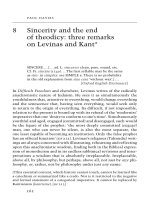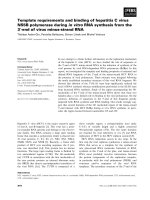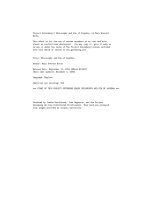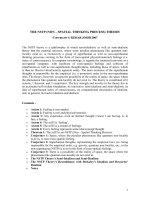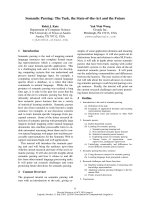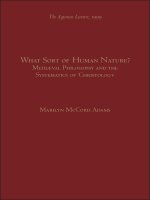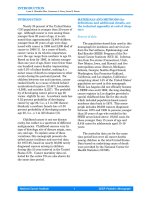The end of comparative philosophy and the task of comparative thinking
Bạn đang xem bản rút gọn của tài liệu. Xem và tải ngay bản đầy đủ của tài liệu tại đây (2.29 MB, 319 trang )
THE END OF COMPARATIVE PHILOSOPHY AND THE
TASK OF COMPARATIVE THINKING:
THE LANGUAGE OF COMPARATIVE PHILOSOPHY, SEEN THROUGH A COMPARISON
OF MARTIN HEIDEGGER, JACQUES DERRIDA, AND CLASSICAL DAOISM.
STEVEN VICTOR BURIK (MA)
A THESIS SUBMITTED FOR THE D
EGREE OF
DOCTOR OF PHILOSOPHY
DEPARTMENT OF PHILOSOPHY
NATIONAL UNIVERSITY OF SINGAPORE
2006
i
ACKNOWLEDGMENTS
A number of people have given me advice and support during the writing of this
dissertation. I thank them hereby. Especially, I would lik
e to thank Roger Ames and Eliot
Deutsch of the University of Hawai’i at Manoa for their valuable contributions to first
drafts of this dissertation. And of course I would like to thank my supervisor Sor-
hoon
Tan of the National University of Singapore for her valuable guidance and patience in
seeing me through this effort.
Steven Burik
ii
TABLE OF CONTENTS
SUMMARY OF DISSERTATION.
v
MOTTO.
1
INTRODUCTION.
2
CHAPTER ONE:
HEIDEGGER AND THE OTHER COMMENCEMENT.
16
1.1
HEIDEGGER’S GR
EEK CONNECTION.
16
1.1.1
ANAXIMANDER
. 21
1.1.2
PARMENIDES
. 28
1.1.3
HERACLITUS
. 29
1.2
HEIDEGGER AND THE POETS
. 35
1.2.1
POETRY AND THINKING
. 37
1.2.2
POETRY AND LANGUAGE
. 39
1.2.3
HÖLDERLIN, THE FOREIGN AND TRANSLATION
. 43
1.3
HEIDEGGER AND THE ‘EAST
.’ 51
1.3.1
EARLY HEIDEGGER
AND COMPARATIVE PHILOSOPHY.
53
1.3.2 LATER HEIDEGGER AND COMPARATIVE PHILOSOPHY. 57
1.4
CONCLUDING HEIDEGGER
. 69
CHAPTER TWO
:
DERRIDA: OTHERNESS, CONTEXT AND OPENNESS
. 72
2.1
DECONS
TRUCTING THE IDEAS BEHIND METAPHYSICS
. 78
iii
2.1.1
MISREADING DERRIDA
. 78
2.1.2
BEYOND HEIDEGGER?
86
2.2
LANGUAGE, TEXT AND TRANSLATION IN DERRIDA
. 95
2.3
DERRIDA IN COMPARATIVE PHILOSOPHY
. 105
2.3.1
IDENTITY AND OPENNESS
. 106
2.3.2
DE
RRIDA’S HINTS AT DIFFERENT CULTURES
. 111
2.3.3
“THE OTHER IS ALREADY THERE, IRREDUCIBLY
.” 122
2.4
CONCLUDING DERRIDA
. 127
CHAPTER THREE
:
REREADING DAOISM; THE OTHER WAY
. 130
3.1
METAPHYSICAL READINGS OF DAOIST PHILOSOPHY
. 135
3.2
THE METAPH
YSICAL TRADITION AND COMPARISON
. 147
3.3
THE POSSIBILITY OF DIFFERENCE
. 150
3.3.1
INTERPRETATIONS OF CLASSICAL CHINESE LANGUAGE
. 152
3.3.2
INCONSTANCY OF
DAO: NO TRANSCENDENCE PLEASE. 169
3.3.3
INSIDE
&
OUTSIDE: THE GATEWAY (
MEN
). 186
3.4
CONCLUDING
DAOISM.
197
CHAPTER FOUR:
THINKING, PHILOSOPHY AND LANGUAGE:
COMPARING HEIDEGGER, DERRIDA AND CLASSICAL DAOISM
. 199
4.1 METAPHYSICS, DIFFERENCE AND COMPARISONS. 202
iv
4.1.1
DIFFERENCE AND COMPARISON.
203
4.1.2
METAPHYSICS AND COMPARISON.
205
4.2
THINKING AND PHILOSOPHY.
215
4.2.1
HEIDEGGER AND DAOISM.
219
4.2.2 DERRIDA AND DAOISM. 237
4.3 LANGUAGE IN COMPARISON. 246
4.4
‘BEYOND’ THE INVERSION OF OPPOSITES
. 261
4.5
ETHICAL AND POLITICAL IMPLICATIONS.
270
4.6
CONCLUDI
NG THE COMPARISON.
278
CONCLUSION.
280
BIBLIOGRAPHY
284
v
SUMMARY OF DISSERTATION.
Often in comparative philosophy Western ideas are superimposed on other cu
ltures.
Western languages play a crucial role in this, as most often comparative philosophy uses
Western languages.
The thinking of
Heidegger, Derrida
, and Daoism, and especially their
ideas on language, can aid comparative
phi
losophy
in trying to o
vercome
the
metaphysical way of thinking that has dominated Western philosophy. In c
omparing
Heidegger, Derrida, and Daoism I argue for a change of perspective towards a non-
metaphysical reading of Daoism, which I think better suits the Daoist sensibilities.
Through a reading of Heidegger’s thinking about the ancient Greeks and some
poe
ts, chapter one argues for the importance of Heidegger’s different view of language
for understanding his place in comparative thinking. Heidegger’s later thinking is fruitful
as it advocates openness towards what is other, and argues for the idea of
Ausei
nandersetzung
as keeping, or gathering of difference.
Chapter two introduces Derrida as a complicated descendant of Heidegger. A
different perspective on language is vital to locate Derrida intelligibly in comparative
philosophy.
Through an analysis of some Derridean terms I argue that context or
difference becomes constitutive of any identity, and as context it is structurally and
inherently open-ended. Applying this idea to language and translation, any closure is
prohibited, and thus texts remain constantly open to different interpretations. The
importance for comparative philosophy is that Derrida shows how Western metaphysical
language is inadequate for comparative enterprises, how identities are never pure, but
always based on relationality. The outside of philosophy is invited in, not to
vi
accommodate itself within the existing sphere, but to upset it.
Chapter three shows the shortcomings and metaphysical inclinations of various
interpretations of Daoism, and then offers a different reading. Through an
interpretation
of classical Chinese language that challenges the universal orthodoxy that writing has to
be a transcription of speech, I argue that a non-metaphysical reading of Daoism is
possible and reflects better the Daoist sensibilities. In Daoism context and relationality
are vital for any meaning to arise, meaning is thus always provisional. However,
language is not denied value, but this value is based on provisionality. An analysis of
translations of certain key characters of Daoism, especially the gateway (
men
) character,
shows that the metaphysical language of Western philosophy distorts important ideas of
Daoism.
Chapter four argues that none of the protagonists deny the value of language;
instead they are acutely aware of the importance of lang
uage in shaping thought. Yet they
point to the limitations of ‘everyday’ language and its reference structure, and point to the
possibilities that arise from thinking through, and thereby seeing and using differently,
language. Notions as Auseinandersetzung,
Ereignis
, context, trace and relationality show
important similarities between Heidegger, Derrida and Daoism, and further point to a
non-metaphysical thinking of the in-between that comparative philosophy could be. I
then establish that the negative approach of Heidegger, Derrida and Daoism must be
understood as a stage, yet that going beyond the inversion of opposites does not have to
lead to positing some kind of metaphysical principle.
1
“Monotonis
ation of the world. Strong spiritual impression of all travels of the last years,
despite the individual happiness: a pale drab of monotonisation of the world. Everything
is becoming similar in its outward appearances, levelling out in a uniform cultural
scheme. The individual customs of peoples are wearing o
ff, the way of dress is becoming
uniform, ethics international. Ever more nations seem fused together, people living and
working in the same way, cities looking alike. Ever more the fine aroma of the
specificness of cultures evaporates, ever more vengeful the colours peel off, and beneath
the cracked layers of varnish the steel-coloured pistons of the mechanical bustle, the
modern world
-
machine, become visible.”
1
“Being at one is godlike and good; whence, then, this craze
among men that there exists
only One, why should all be one?”
2
1
Zweig 1990, 30, my translation.
2
Hölderlin 1966
,
70/71
(translation modified) and 1970, 241:
“Einig zu sein, ist göttlich und gut; woher ist die Sucht denn
Unter den Menschen, daß nur Einer und Eines nur sei?”
2
INTRODUCTION
.
Comparative
philosophy is a relatively young discipline in philosophy. The realisation of
the fundamental limitations of Western style (mainstream) philosophy, with its
demands
for
strict logic and rationalism, as well as the increasing awareness that every single form
of philosophy, and even scientific research, carries with it (the burden of) a cultural
component and foresight, have resulted in more and more Western philosophers taking an
interest in the ways of thinking of other (than Western) cultures, that were looked down
upon earlier in Orientalist ways. On the other hand, non-Western cultures have felt the
growing
need to assess and integrate their respective forms of thinking in the greater
philoso
phical discourse. Non-Western cultures are not only
realis
ing the importance of
coming to terms with the West in a more profound way by advocating their own
traditions in the philosophical discourse, but they are also aware that their own
philosophies
and c
ulture
s per se are very much worth
further
exploring
and comparing
with other non
-Western ways of thinking.
Let me start with an explanation of my views on what comparative
philosophy
should and should not be, at least if it is sincere in trying to be truly inter-
cultural.
Comparative philosophy can not stop at the finding and explanation of similarities and
differences between thinking from different cultures, however valuable these findings
are. As a discipline, it should locate itself between these differences, while aware of the
impossibility of a purely neutral viewpoint, and in that sense I use the term inter-cultural.
Being between different cultures suggests not the Western metaphysical ideal of
objectivity, but does suggest the openness towards what
is other.
3
In the last decades, comparative philosophy has seen great development. I think
re
cent scholarship in comparative
phi
losophy and other areas exhibits very little anymore
of
Edward Said’s Orientalism
3
in the sense of a feeling of
Western
superio
rity or
imperialism, but that does not mean it is now completely neutral. Rather, my argument
will be that the language of many intercultural encounters still displays and favours a
prejudiced and one-sided way of thinking, even if often not consciously, and that this
one
-sidedness is presented as neutrality or objectivity. Said showed convincingly that
there is a certain mindset at work in a lot of scholarly work which involves the encounter
between
different cultures. This mindset to him is the result of colonial imperialism,
which gave rise to the idea of
the
supremacy of certain (mainly Western) civilisations or
cultures over others. According to Said, even in this present era much of what he
considers
to be Orientalism still dominates scholarship on other than Western cultures
.
Said
’s notion of Orientalism made problematic certain questions of how to (re-
)present
other cultures, or of what constitutes another culture. His main idea is that most
representations are biased in that they tend to see the other culture as inferior, and
promote and justify the dominance of the representator’s culture over that of the other.
Heidegger has argued in similar vein that disciplines like ethnology already
“operate with definite preliminary conceptions and interpretations of human Dasein in
general,”
4
and while Heidegger does not have the political implications in mind that Said
has uncovered, we can read in this the idea that the West imposes its structures and
3
See Said 1978.
4
Heidegger 1993, 51; 1962, 76. In this dissertation I work with both original German language works by
Heidegger and English translations, and refer to these in the following way: If
the reference is to an original
German language work, the year of publication and page number will appear in normal type, and where
possible and available the reference to the work in translation will follow in
bold
type. In general I will
follow available translations of Heidegger, unless there is either none available or I do not agree with the
translation, in which cases translations will be mine, as will be indicated, and in such cases and others
where I find it clarifying, the German original passage
will appear in footnotes.
4
conceptions on other cultures.
A similar thing has often happened in comparative philosophy, whereby Western
ideas, concepts and thought structures were superimposed on other cultures with the idea
that these were a more truthful approach to what ‘they’ were really thinking. It is here
that Western languages play a crucial role, as most intercultural exchanges in philosophy
are ‘done’ in Western languages. It will thus be argued that the language of current
comparative
philosophy shows a proclivity or tendency towards a form of Ori
entalism,
very subtle but still
present
indeed in the ways of communication and the focus of
scholarly research, and which, thought through, has certain philosophical and even
political implications which arise from misunderstanding or misrepresent
ing
other
cultures.
Contrary to s
uch
misrepresentations, to accommodate different ways of thinking
into one discourse without that discourse favouring one of these ways above the other,
and thus to make productive meetings possible, should be one of the main tasks of
comparative philosophy. This task is by no means an easy one, and it remains to be seen
whether this is at all possible without getting caught in some political, linguistic,
metaphysical or other prejudice. This will be one of the main questions of this
dissertation. I will explore the possibility of a different reading of the protagonists that
seeks to avoid the standard metaphysical implications. The comparative
way
of thinking
wishes to acknowledge and promote the
equivalence
of
different
cultures,
whereby
othe
rness and diversity are valued above equality and unity. Equivalence does not mean
equa
lity, for to ‘make equal’ carries with it the connotation of getting rid of differences.
In this sense the language of Western philosophy has been notorious for its equalis
ing
5
effects because of its thinking in terms of generalisations, ideas of identity and unity
valued over difference and change. It is also a fact that most if not all Western languages
have been so influenced by the metaphysical way of thinking that it is hard to even brin
g
up the idea of some different way of thinking. Therefore
a new way of seeing language is
vital
for the project of comparative philosophy. It is clear that comparative
thinking
should not be a proponent of some obscure world syncr
e
tism or of a ‘melting of
horizons’
that would annihilate all differences and thus the richness of diversity in favour of unity
or identity, a world culture. We should avoid trying to make things identical (what
Heidegger calls das Gleiche), but we should treat them as being similar in a different
way
, which translates Heidegger’s notion “the same” (das Selbe). As he says: “But the
same is not the merely identical. In the merely identical, the difference disappears. In the
same the difference appears ”
5
It is problematic to think of a ‘common’ ground in this
respect. Although Heidegger has referred to such a thing on occasions, he simultaneously
hinted that this common ground could be nothing but a hidden one.
6
One focus of this
r
esearch will be to look for the way this ‘common’
g
round
is to be thought of
, and
what it
would
entail.
If anything, it should admit of differences as equally originary. Similarities
at some level should not function as above, or more important than, differences.
The idea of comparative philosophy which will guide me in this dissertation thus
has the following characteristics. Comparative philosophy should focus on two things,
similarities and differences between ways of thinking. It should however not content
itself with merely pointing to these similarities and differences, but instead seek to make
them productive in the sense that through these similarities and differences we come to
5
Heidegger 1999, 35; 1974, 45: “Allein das Selbe ist nicht das Gleiche. Im Gleichen verschwindet die
Verschiedenheit.
Im Selben erscheint die Verschiedenheit.”
S
ee also: Heidegger 1994b, 187
.
6
Heidegger 1997b, 94;
1971a,
8.
6
understand better first of all what we are comparing, and second the way in which we
compare these philosophies and that means also our contemporary philosophies and
presuppositions of how we perceive our world. I do not believe in one overarching theory
or methodology of comparative philosophy. In that sense my approach is hermeneutic, in
that it recognises the necessity of perspectives. There are however a couple of ideas
which comparative philosophy should adhere to. It should seek a dialogue, between two
different cultural perspectives (and it must be noticed that the Western philosophical
tradition, although often one of the interlocutors, is not necessarily always involved), that
is based on equivalence. This dialogic approach means that comparative philosophy
should try as much as possible to position itself in-between the different cultures. How
this in-between is to be perceived will be addressed in this dissertation. But at least it is
not meant to overcome differences, but to acknowledge and appreciate them in a
realisation of the complementarity of perspectives. Raimundo Panikkar argues for
example that comparative philosophy should be understood as “diatopical
hermeneutics,”
7
by which he means a search for understanding in a dialogue between
different spaces.
My understanding of comparative philosophy also entails that theory and practice
of comparative philosophy can not be separated. This is meant in a double sense. First of
all, it means that it is impossible to abstract a purely theoretical methodology, which
would somehow stand above, and be applicable in, all instances of comparative
philosophy. Second, it means that as such, any comparison is of necessity related to the
theory of comparative philosophy in that it is only in the comparisons that we can locate
7
Se
e Panikkar’s contribution to
Interpreting Across Boundaries
(Larson & Deutsch (eds.) 1988), especially
130
-
136.
7
any theory or method. In other words, the interlocutors
of
the comparative dialogue to a
large extent dic
tate the guiding theory behind that particular dialogue. So this dissertation
is as much an exercise
in
comparative philosophy as it is
about
comparative philosophy.
In other words, we can only learn about comparative philosophy by doing it, by actively
cr
ossing over to different ways of thinking. Since I believe and hope to prove that a non-
metaphysical understanding of Daoism is feasible, in effect this means that comparing
Heidegger, Derrida and Daoism will entail a non-metaphysical and non-
dialectic
app
roach or what Heidegger has called
Auseinandersetzung
. This approach is the only
possible way to take serious the fact that there is no neutral overall birds-eye view from
which we could objectively look down at the compared ways of thinking.
8
Last, but maybe most important, understanding comparative philosophy as a
constantly renewing dialogue entails that language is a crucial factor. Any comparative
philosophical enterprise has to be cautious of the language it uses. Certain conceptual
schemes are so embedded in Western languages that it is hard to avoid or circumvent
them within these languages, but this is exactly what we need to do in order for different
conceptual schemes to be brought forward in comparative philosophy. With this in mind
I
wish to research the philosophies of Heidegger, Derrida, and classical Daoism, and hope
to show that the ideas of language propagated in these ways of thinking can aid the
project of comparative
phi
losophy
specifically, and philosophy
general
ly,
in trying to
overcome
its suffocating ties to the metaphysical way of thinking that has dominated
Western philosophy for the last twenty-five hundred years and is still dominating and
8
I do not hereby deny that some comparisons of certain ways of thinking can be comparisons of the
metaphysics involved in these ways of thinkin
g, yet I do wish to argue that even such a comparison in itself
should not aim at or be led by a supposedly neutral metaphysical principle or a dialectical sublimation of
the differences.
8
frustrating our efforts in intercultural encounters. This dominance of metaphysics in
philoso
phy will be evident if we look closer at Heidegger’s and Derrida’s writings on
these subjects, which will also show how Western languages in general have been
influenced by philosophical ideas and language, and have thereby become biased through
this metaphysical dominance. In the same way, I will show how many interpretations of
the Daoist classics have inserted this same bias in an effort to appropriate Daoism into the
wider philosophical discourse. In arguing against what I would call these metaphysical
interpretations I am not suggesting that there is some other, true meaning of what these
Daoist classics mean.
9
On the contrary, I am suggesting that the search for such a strict
unified meaning is futile considering the inherent vagueness of the compositions and the
language used. This does not mean however, that Daoism is open to an “anything goes”
attitude, a relativism or scepticism. Obviously, some interpretations make much more
sense than others. The importance of my approach lies more in the idea that comparative
philosophy should also further our understanding of the problems we face today, and that
means that a purely historical approach or one-sidedly metaphysical approach is
unsuitable. We need to look at the possible contributions of the thought of Heidegger,
Derrida and Daoism to a better understanding of this world, and that means an attitude
that is more open to different interpretations of the texts of these three protagonists.
MAIN QUESTIONS.
There are then a number of questions which this r
esearch will try to address, and the main
9
The metaphysical interpretation of Daoism is not a specifically Western invention or imposition.
Metaphysical interpretations have been found in the Chinese tradition as well, for example in the Wang Bi
commentary on the
Daodejing
. Yet my main concern is the domination of the comparative discourse by
these metaphysical approaches, and that is why I focus more on the Western interpretations of Daoism, and
those by Chinese scholars who seem influenced by these Western interpretations.
9
one will be:
To what extent are differences in language and the backgrounds of
particular languages used by Heidegger, Derrida and Daoism affected by
and do they affect not only philosophy in general and culturally different
ways of thinking in particular, but especially the ongoing efforts in
comparative
philosophy, and thus in what way do these differences in
languages have an e
ffect
on intercultural understanding?
To further explain this main question a number o
f related questions are asked:
1
What exactly is the influence of language and its use in
the thinking of
Heidegger,
Derrida and Daoism? Are there similarities in their ideas or use of language, and if so,
what do these amount to if we apply them to intercultural encounters, dialogues etc? And
are there serious differences in their linguistic views, which would warrant caution in
trying to apply similarities?
2 In relation to this, how should we see the ongoing practice of intercultural
understanding in mostly Western languages? We could see this in two ways, as an
obstruction and hindrance to intercultural understanding, or as a
necessary
medium
of
comparative
philosophy. Another question here would be if a change to other than
Wes
tern languages for compara
tive
philosophy would not run the same risks.
3
Does the recognition of important differences in language and in ways of thinking
lead to a position of relativism or not? What are the communication possibilities? Is i
t
possible to take an objective stand and maintain that serious and unprejudiced
communication is possible, or do we have to admit to the
hermeneutic
fact
brought to our
10
attention by Gadamer that no dialogue or discourse is ever so neutral, that prejudice or
perspective is inevitable, but that
we can turn this into a positive aspect of understanding?
Yet
what are the consequences of such a view?
4 What can be said of the existence of ideas
about
intercultural encounters in
Heidegger,
Derrida and Daoism
? Aside (or maybe not) from the language, ar
e there ideas
to be found which expressly relate to other cultures, or from which we can c
onstruct ideas
on how these three
would look at universalism or cultural differences and the way to deal
with them?
5 The idea of ‘Nothingness’
10
is prominent in Heide
gger
and Daoism, and to a
lesser extent in Derrida as well. What is the status of this Nothingness, as it seems often
to be seen
as something beyond language? How does language relate to this Nothingness,
and how is it seen to function within and without l
anguage?
6 How exactly is language seen here? Does it consist solely of the spoken and
written word, or should we extend the meaning of language by including different sign
structures, like art, music and poetry? As we shall see, poetry has a special function for
Heidegger, and we will have to rethink in what way we extend the meaning of language.
Do we just widen the scope of language, or do we have to radically rethink the whole
idea of language and its functions?
If we do, what are the consequences for p
hilosophy?
7 Given the findings, what in the end should comparative philosophy stand for and
what should it practically consist of? What are its possibilities?
10
This dissertation will feature a number of odd or even nonexistent English words or neologisms, as well
as untranslated German and French words and neologisms, and further untranslated classical Chinese
characters in Romanisation. The reader is asked to be patient in this respect and to acknowledge the
necessity of my stretching of the Englis
h language or resorting to non
-
English in making my arguments.
11
These questions are not easy ones. This dissertation attempts to shed some light on the
questio
ns of the problem of
how
language and interpretation go together in comparative
philosophy. Heidegger, Derrida, and Daoism might be able to change our ways of
thinking about these problems, in anticipation
of a different way of thinking. Guiding this
attem
pt will be the notion of a dialogue between them, thought through from different
perspectives such as logos, p
olemos,
p
hysis
, differance, trace, supplement
and
dao, tian,
men,
ziran, w
uwei
.
11
Starting with Heidegger’s approach to comparative philosophy I wi
ll
then bring in Derrida as both a proponent of this approach and as its critic, and proceed to
see whether his philosophy allows a comparative variant and whether his critiques
directed at language offer a viable alternative to the traditional thinking of identity and
opposition that still dominates philosophy today. From ‘the other side,’ Daoism will be
put in intercultural perspective as well, and its interpretations by Western language
translators and philosophers scrutinised. Heidegger and Derrida show that the
metaphysical idea of language as naming can be seen as an attempt at identification and
stabilisation, fixing reference, to which my interpretation of Daoism would offer an
alternative view, resulting from the horizons expanded by Heidegger and Derrida, but
most of all in accordance with the ‘original’ openness of Daoism.
The whole process of this dissertation will have to keep in mind that it is a work
about three different philosophies, in three (or more) different languages. To
accommodate these into English is not something to be seen as a side effect. It is rather
one of the main problems. To give but one example beforehand, the dynamic or process
character of Heidegger’s work, especially his ‘verbal’ thinking, is hardly translatable into
11
Romanisation of Chinese characters will be according to the now standard Pinyin conversion, except in
quotations where the Wade
-
Giles Romanisation is used, so as not to disrupt the original
translations.
12
Eng
lish, as any translation becomes static very easily. Think of
Wesen
, usually rendered
as ‘essence,’ or sometimes as ‘root unfolding.’ It is easy to misread ‘essence’ in a
metaphysical way as substantial and thereby neglect the ‘esse’ in it. And as a rather bad
starting point I could quote Heinrich Petzet, Heidegger’s long term friend, who on the
occasion of being presented with the English translation of Sein und Zeit complained that
“almost every sentence either missed an essential point or failed to consider a perhaps-
significant nuance of meaning. This was confirmed when we [Heidegger and Petzet,
SVB] went through the translation sample together.”
12
I will try to alert the reader to
these problems throughout the dissertation, but will nevertheless venture forth. The main
focus will thus be on language and on the
logos
of dialogue, and on the supposed
‘nothingness’ as the guiding principle, but this will be rethought from three different
sides in a way which runs counter to usual interpretations.
To conclude this introduction, we need to be aware that while the dialogue is the
most important means for comparative thinking, language is also the foremost danger in
this area. The development of ideas about translation and its importance in philosophy of
languag
e seems to warrant a closer look at translation(s). W.v.O Quine’s theory of the
indeterminacy of translation
13
is that there are always different possible translations, and
that it is only a matter of elegance or usefulness which translation is chosen. Ther
e are no
objectively true translations. Quine uses this theory to argue that meaning itself is relative
or indeterminate, because there is no objective language which will capture
the
meaning
of things. Donald Davidson
14
seems to avoid this at first, but he can only do so by
12
Petzet 1983, 176
-
177;
1993, 168
. Words or sentences in quotations followed by SVB, in square brackets,
are mine but in line with the text.
13
See Quine 1960, especially 22
-
35, and Quine 1998.
14
See Davidson 1998.
13
assuming
some basic truth on which he grounds his theory of meaning. Certain
constraints are introduced to get an idea of this truth. But Davidson can only defend these
constraints by introducing the ‘principle of charity,’ which basically assumes that we
assign our own beliefs and ideas of truth onto speakers of other languages and cultures,
holding our Western notions as universal truth conditions. And even if we do not
extrapolate our own beliefs, others are at least supposed to be
int
elligible
to us, which can
only mean we assume that they think like us, in similar categories, and from there we
arrive at meaning. But even with this theory Davidson can not deny some degree of
indeterminacy of interpretation, translation and thereby mean
ing.
There is thus a translation problem in philosophy of language, and the research
will take
this
indeterminacy of language up using
Heidegger and Derrida, who have both,
although in different ways, done very much for a different appreciation of the role of
language in philosophy. There are different sorts of language used in different areas of
philosophy. There is for example a certain use of language in analytic philosophy, and a
different one in continental philosophy, and yet a different one in Daoism. So there are
not only translation problems between languages, but also between different ways of
thinking within one language. English can be used in a specific way for analytic
philosophy, but also for continental philosophy, where it is used in a different way.
Philosophical languages can then not be simply equated or sided with natural languages;
different philosophies imply a specific use of languages. Different use, different meaning.
What my research will focus on is mainly continental philosophy in relation to classical
Chinese philosophy in translation, where different ways of thinking try to find a way of
expression in one language. The question is whether such a one language, in this case
14
English, will be able to provide enough ‘space’ for such d
ifferences to emerge.
The point of all this is that I realise
that in the ideal circumstances I would have to
have proficiency in the classical Chinese language. But nevertheless I think that even
without this proficiency and with just some acquaintance with classical Chinese, I can
still make a valuable contribution. I am not doing a language study; my main concern is
how language is used, how it functions in (intercultural) dialogue, what the metaphysical
assumptions behind it are, if there are any, and how language is seen to relate to the
world and reality. In my view this can be done by studying works on Chinese language,
and by studying the way translators, commentators, philosophers and interpreters have
dealt with the problems they encountered. This will bring out the profound differences of
the Chinese language from Western languages, and thereby the difference in ways of
thinking
in
Daoism in an equally thorough fashion. The point is that I think it is possible,
without fluency in classical Chinese, to nevertheless raise interesting questions about the
Daoist way of thinking by looking at the differences in translations and interpretations
and the reasons that translators and philosophers have given for defending these
differences, questions which might then be addressed by those with sufficient knowledge
of classical Chinese. It is also the case that as this is a work in the English language, it
appeals more directly to English speaking readers, and one of its main points is to show
the difficulties that arise especially in the space
between
cultures. By taking into account
as many differing translations and interpretations as possible, I hope to make up for the
l
ack of proficiency in classical
Chinese.
Another reason why I believe I can make a valu
able contribution is that one of the
things I hope to show is exactly how being able to read Chinese does not necessarily
15
entail getting closer to the meaning of the Daoist classics. Ability in a foreign language is
always influenced by certain ways of thinking, and scholars with proficiency in classical
Chinese are known to widely differ on many aspects of the language. But even without
such proficiency, the main aim of this dissertation is to promote intercultural
understanding. This understanding is much needed today, and it is unrealistic to assume
or expect proficiency in multiple languages to be a necessary requirement for the
expansion of such understanding. I hope to show in conclusion that comparative thinking
is possible despite the inherent danger
s of interpretation, translation and language.
16
CHAPTER ONE
HEIDEGGER AND THE OTHER COMMENCEMENT.
1.1
HEIDEGGER’S GREEK CONNECTION
.
“…that every reflection upon that which now is can take its rise and thrive only
if, through a dialogue with the Greek thinkers and their language, it strikes root
into the ground of our historical existence. That dialogue still awaits its
beginning. It is scarcely prepared for at all, and yet it itself remains for us the
precondition of the inevitable dialogue with the East
Asian world.”
1
Heidegger himself started or at least prepared both of the abovementioned dialogues. The
first one, the dialogue with Greek thinking, was already long on his agenda as a means to
help the overcoming of
Western
metaphysics. The fundamental characteristic of this
metaphysics is the distinction between the sensuous and the non-sensuous since the time
of Plato. The outcome of this distinction can be seen throughout the history of Western
philosophy, as the abstracting and theorising influences of the later Greeks, the
theologising influences of medieval times and scientification in more modern times of the
originary thinking of Being. In general this distinction has led to further distinctions such
as between form and matter, essence and attributes, mind and body, truth and appearance
etc. Related to these general distinctions there arose the hierarchical view that one side of
the distinction was worthy, good and true, while the other was at best a hindrance with
which one had to live, or at wors
t something evil that was to be eradicated.
1
Heidegger 1994b, 43;
1977,
157
-
158
.
17
The transformation that thus took place throughout the history of thinking brought
about and was brought about by a change of the functioning of language, in a reciprocal
way, and the dominant theory has since become our standard way of seeing and
experiencing the world, with little or no tolerance towards views which differ profoundly.
The ancient Greeks were precisely different from this dominant metaphysical tradition in
that they were before metaphysics, so what Heidegger saw in them was an opportunity
for finding a different way of thinking which could challenge the dominating philosophy
of his own time.
It would be hard to overestimate the influence of early Greek thinking on
Heidegger’s work. In nearly all his writings there are usually at least a mention or
reference to an ancient Greek word or saying. As Heidegger obviously felt that the
language of certain Presocratics was worth thinking over against the usual interpretations
that are normally given, it is only logical that I too should venture into this. Because
Heidegger thought that by looking more closely at the way in which the Greeks actually
thought
, or rather in how Heidegger reinterpreted them, we could find what is really
worthy of thought. This
Wiederholung
of Greek thinking is very important for
the
project
of
comparative philosophy in two ways. First of all, Heidegger thought
the
Auseinandersetzung
2
with the Greeks a necessary precondition for the possibility of an
encounter
with
the East Asian
world.
His argument for this was that he thought that
modern philosophy had become corrupted by the narrowness of the metaphysical and
2
As we have briefly seen before,
Auseinandersetzung
is one of the key words in Heidegger’s thinking and
also of this dissertation. A possible translation of
Auseinandersetzung
could be con-frontation, as it
captures most of the meaning of coming together in difference through the hyphen. In most cases I will
leave it untranslated because it is a word so important that a false translation or one that does not capture its
full and ambivalent meaning, would seem inappropriate. There will however be discussion and explanation
of the word throughout the dissertation.
Wiederholung
is another important word. Usually translated as
‘repetition,’ We will see that Heidegger means it to be anything but a mere repeating of what others, in this
case the ancient
Greeks, have said and thought.
18
purely rational way of thinking, making it unsuitable for an encounter with very different
thinking, this different thinking being exactly what Heidegger expected to find in East
Asian thought. This narrow metaphysical outlook and the insistence on its rightness in
certain places would prevent any encounter that would not try to explain things according
to Western ideas and
values. Heidegger also thought that in East Asian thinking he would
find, along with a way of thinking that was not influenced by metaphysics as we know it
in the Western world, languages or at least views on language that were equally unspoilt.
The second reason why the dialogue or
Auseinandersetzung
or con-
frontation
with the Greeks is important, is that Heidegger’s translations and readings of the (ancient)
Greeks is exemplary of the way he wishes us to approach that which is ‘
foreign
’ or
‘other
,’ in a thoughtful con-frontation that leaves what is con-
fronted
as it reveals itself,
from itself, and to give this ‘other’ the space to do so. In other, slightly less Heideggerian
words, the way to approach what is other is to let it speak for itself. The real difficulty is
how to achieve this. Of course, ancient Greek civilisation has long vanished, and the
same goes for the world of the Daoist classics, so even if given the chance, how c
ould
they be speaking for themselves? In spite of this obvious discrepancy, Heidegger thinks
there are opportunities to think these ways of thinking in a more originary way, to make
them speak again
or rather to make them speak to us
. In what follows, I will focus largely
on Heidegger’s rethinking of the Presocratics, whom he saw as the representatives of
thinking before it was overtaken by metaphysics. Insofar as philosophy has become
metaphysical, he considered the Presocratics not philosophers, but “greater thinkers,”
3
who thought before
Seinsvergessenheit
, the forgetfulness of Being, made its entry into
thinking, turning it into philosophy as metaphysics.
3
Heidegger 1963, 24, my translation.
